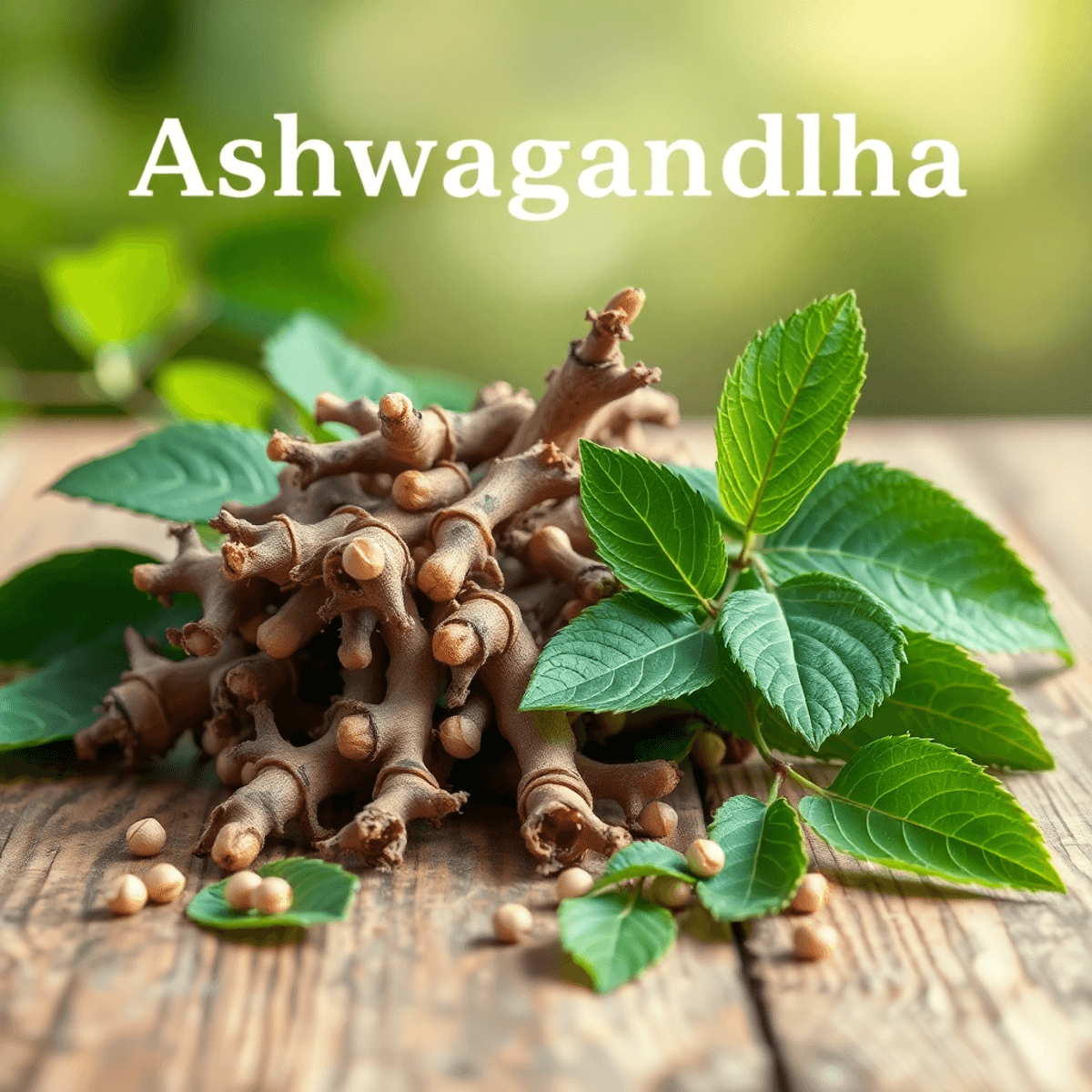Introduction
Anxiety has become a prevalent concern in modern life, prompting many to seek effective solutions for relief. Among various natural remedies for anxiety, ashwagandha has emerged as a promising option.
Known scientifically as Withania somnifera, this herb is classified as an adaptogen, which means it helps the body adapt to stress by regulating physiological processes.
Ashwagandha’s potential in offering anxiety relief is gaining attention due to its ability to reduce stress-related symptoms. Research suggests that ashwagandha can help with anxiety by lowering cortisol levels—a hormone closely tied to the body’s stress response. This positions it as a valuable ally in the quest for mental calm and balance.
This article delves into the science behind how ashwagandha reduces anxiety levels, providing insights into its efficacy. It also offers practical advice on incorporating this powerful herb into your routine. By understanding its role and benefits, you can make informed choices about utilizing ashwagandha effectively in your journey towards tranquility and well-being.
Understanding Ashwagandha: The Ayurvedic Herb with Anxiolytic Properties
Ashwagandha, scientifically known as Withania somnifera, is often referred to as Indian ginseng or winter cherry. This resilient shrub thrives in the dry regions of India and Southeast Asia, characterized by its small green flowers and fruit. Its roots and leaves are primarily used for medicinal purposes.
In the realm of Ayurveda, an ancient system of medicine practiced in India, ashwagandha has been a cornerstone for mental health support. Traditionally, it was employed to ease anxiety symptoms and bolster mental resilience. The adaptogenic properties of ashwagandha allow it to modulate the body’s stress response, providing a natural means to manage anxiety.
As an adaptogen, ashwagandha helps the body maintain balance in times of stress. It does so by regulating physiological processes, enhancing the body’s ability to cope with stressors. This classification underscores its role in promoting overall well-being, making it a valuable ally in navigating modern life’s challenges.
The potential ashwagandha anxiety benefits lie not only in its historical use but also in its scientifically backed ability to support mental equilibrium, offering a holistic approach to health that resonates with those seeking natural solutions.
The Science Behind Ashwagandha’s Anxiolytic Effects
Understanding how ashwagandha works in the body helps us see why it might be useful for managing anxiety. This ancient herb has a unique way of influencing our response to stress, which is closely connected to its effects on cortisol levels and the HPA axis.
1. Cortisol Regulation
Cortisol is often referred to as the stress hormone because it plays a crucial role in how we react to stressful situations. When we’re under pressure, our bodies release cortisol to help us cope. However, consistently high levels of cortisol can actually worsen anxiety disorders. That’s where ashwagandha comes in – it has the potential to regulate cortisol levels, reducing the physical responses associated with stress and ultimately alleviating anxiety symptoms.
2. Mechanism of Action
So how does ashwagandha achieve this? One key way is by enhancing our body’s resilience to stress. It does this by influencing neurotransmitters – chemical messengers in the brain that affect our mood and emotions. By promoting balance in these systems, ashwagandha creates an internal environment that is less susceptible to anxiety.
3. HPA Axis Modulation
Another important aspect of ashwagandha’s action is its effect on the HPA axis. This axis is responsible for regulating our body’s response to stress by controlling the release of various hormones, including cortisol. By modulating this system, ashwagandha helps ensure that stress hormones are released in a more controlled manner, leading to greater stability and calmness during challenging situations.
These insights into ashwagandha’s biological mechanisms provide evidence for its potential as a natural remedy for anxiety – one that may offer relief without relying solely on traditional medications.
Exploring the Benefits of Ashwagandha for Anxiety Relief: Insights from Research Studies
Research studies on ashwagandha for anxiety relief have increasingly highlighted its potential in managing anxiety disorders. A notable study published in the Journal of Clinical Psychiatry found that participants who consumed ashwagandha reported a significant reduction in anxiety symptoms compared to those who received a placebo. These findings align with other research indicating that ashwagandha effectively helps to alleviate anxiety.
Measuring Anxiety Symptoms
To measure the effects on anxiety disorders, researchers often utilize validated rating scales. The Hamilton Anxiety Rating Scale (HAM-A) and the Depression Anxiety Stress Scale (DASS) are commonly used to quantify changes in anxiety levels among study participants. These tools provide a standardized approach to assess the severity of anxiety symptoms before and after ashwagandha intervention.
Compelling Evidence Supporting Ashwagandha
The evidence supporting ashwagandha’s role in reducing anxiety symptoms is compelling. Participants consistently show improvements across various studies, showcasing the herb’s potential as a natural remedy for those seeking alternative or complementary treatments for anxiety. With an emphasis on scientific validation, these research findings bring credibility to ashwagandha’s reputation as an effective tool to help manage and reduce anxiety levels in individuals.
Beyond Anxiety: Additional Mental Health Benefits Associated with Ashwagandha Consumption
Ashwagandha’s benefits extend beyond anxiety relief, offering potential support for managing various psychological conditions. Research highlights its promising role in depression management, where the herb may help alleviate mood disturbances and increase overall mental resilience. This adaptogenic herb is also being studied as a supportive option in PTSD treatment, showing potential in reducing stress-related symptoms and improving emotional well-being.
The cognitive benefits of ashwagandha cannot be overlooked. Its consumption has been associated with cognitive function improvement, including enhancements in memory and attention. Studies suggest that the potent compounds within ashwagandha may aid in bolstering brain health by reducing oxidative stress, potentially leading to sharper cognitive abilities.
- Depression Management: Potential mood-stabilizing effects.
- PTSD Treatment: Reduction in stress-related symptoms.
- Cognitive Function Improvement: Enhancements in memory and attention.
This wide array of benefits makes ashwagandha a versatile herb not just for those seeking anxiety relief but also for individuals looking to enhance their overall mental health landscape.
Practical Considerations for Using Ashwagandha Safely and Effectively in Your Anxiety Management Journey
Exploring the various forms of ashwagandha can help you choose the best method tailored to your lifestyle and preferences. It’s available in multiple forms, each with distinct advantages:
- Capsules: Convenient for on-the-go usage, capsules ensure consistent dosage but may take longer to digest.
- Powders: Versatile and easily mixed into smoothies or teas, powders offer flexibility but require precise measurement.
- Liquid Extracts: Quickly absorbed by the body, liquid extracts are ideal for those who struggle with swallowing pills but often have a stronger taste.
Understanding the ashwagandha dosage guidelines is crucial to harness its benefits effectively. Research suggests a daily intake ranging from 250 mg to 1,250 mg, depending on individual factors such as age and overall health status.
Consider beginning with a lower dose to assess tolerance and gradually increasing it under guidance. Consulting with a healthcare professional is advisable, especially if you have pre-existing health conditions or are taking other medications. This ensures that your anxiety management journey remains safe and aligns with your personal health goals.
Incorporating Ashwagandha into Your Daily Routine: Tips for Maximizing Its Benefits While Minimizing Risks
Ashwagandha supplements are generally safe for short-term use, typically up to three months. However, it’s essential to be aware of potential side effects that some individuals may experience. These can include:
- Gastrointestinal Discomfort: Symptoms such as upset stomach or nausea.
- Drowsiness: Some users report feeling unusually tired or lethargic.
Taking precautions is crucial if you are pregnant, breastfeeding, or have specific medical conditions. Ashwagandha may interact with certain medications, especially those for thyroid issues or blood sugar regulation. Consult with a healthcare professional before starting any new supplement regimen.
To incorporate ashwagandha effectively into your routine and help manage anxiety, consider these tips:
- Start with a Lower Dose: Gradually increase the dosage while monitoring for any adverse effects.
- Consistency is Key: Taking ashwagandha at the same time daily can optimize its benefits.
- Pair with Meals: Consuming with food may reduce gastrointestinal side effects.
By understanding these guidelines, you can maximize the potential of ashwagandha to help with anxiety while minimizing risks associated with its use.
A Holistic Approach to Managing Anxiety: Combining Ashwagandha with Other Stress Reduction Strategies
Integrating ashwagandha into your daily routine can be both simple and effective. Timing is key; consider taking ashwagandha supplements alongside meals to enhance absorption and minimize potential gastrointestinal discomfort. This herbal supplement for mental health support can be found in various forms—capsules, powders, or liquid extracts—allowing flexibility based on personal preferences.
Pairing ashwagandha with other evidence-based stress management techniques can further amplify its benefits. Mindfulness meditation serves as a powerful tool, encouraging a state of relaxation that complements the adaptogenic properties of ashwagandha. Engaging in regular exercise also offers significant advantages, promoting endorphin release which naturally elevates mood and reduces anxiety.
Combining these practices creates a comprehensive approach to managing stress and anxiety:
- Mindfulness Meditation: Establish a daily practice, potentially after taking your ashwagandha dose.
- Regular Exercise: Incorporate physical activities like yoga or brisk walking into your schedule.
- Balanced Diet: Ensure your meals are rich in nutrients that support mental health.
By integrating these strategies, you harness the power of both natural supplements and lifestyle changes, creating a balanced path towards reducing anxiety and enhancing overall well-being.
Conclusion: Embracing Nature’s Gift in Your Quest for Calmness Within Reach
Taking a complete approach to managing anxiety shows great promise. Ashwagandha, a natural solution, has proven to be a reliable companion on this journey. By combining various resources like herbal remedies such as Valerian root and lifestyle changes, you can effectively control anxiety and cultivate a feeling of peace.
Incorporating high-intensity interval training into your routine can also help alleviate stress and anxiety levels. Additionally, utilizing aromatherapy diffusers with calming essential oils can create a soothing environment that promotes relaxation.
Moreover, maintaining a balanced diet with the help of slimming teas for diet or dietary supplements can significantly improve your overall well-being. It’s important to remember that each individual’s journey is unique, and finding the right combination of methods is key to effectively managing anxiety.
- Explore Different Resources: Use ashwagandha along with other methods to reduce stress.
- Quality Matters: Choose reputable brands when sourcing herbal supplements to ensure their effectiveness and safety.
With mindfulness and a commitment to quality control, make ashwagandha an essential part of your search for tranquility.
“This content is for informational purposes only and should not be considered as medical, legal, or professional advice. Always consult a qualified professional or your healthcare provider for personalized guidance.”
Discover more from NatureZen Market
Subscribe to get the latest posts sent to your email.











